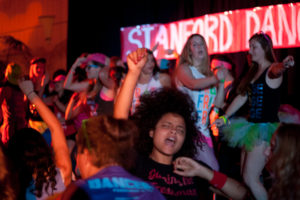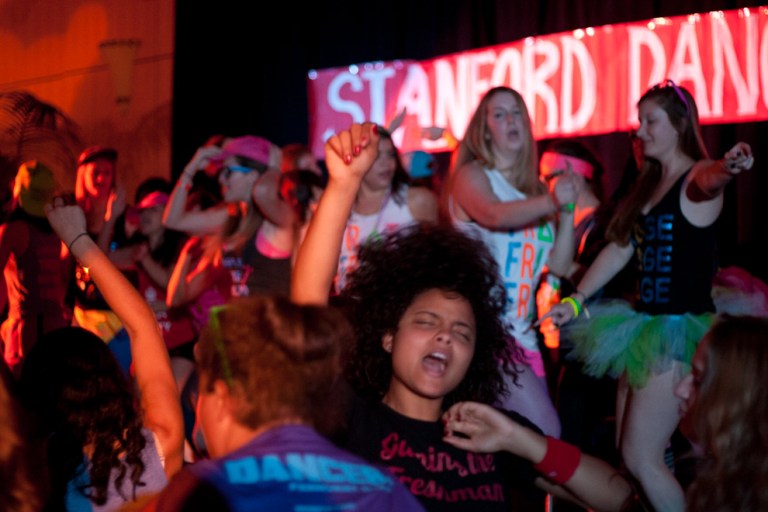Stanford Dance Marathon is partnering with the Bass Center for Childhood Cancer and Blood Diseases at Lucile Packard to raise funds for families who cannot afford cancer treatment. All donations go to the uncompensated care program to help young patients in need of bone marrow transplants, blood donations and cancer treatment locally, in contrast to previous years where funds were sent overseas.

Dance Marathon runs for 24 hours on Saturday, Feb. 18 at the Arrillaga Outdoor Education and Recreation Center and has traditionally partnered with organizations involved in universal healthcare. Last year, Dance Marathon benefited Partners in Health in Rwanda to donate funds for cancer treatment.
According to Dance Marathon Outreach Director, Maya Kuppermann ’18, Dance Marathon directors wanted students to feel like they are helping to make change locally.
“This is a really special way to connect with something that is outside the ‘Stanford bubble,’ but something that is just right outside of it instead of so far away,” Kuppermann said.
Kuppermann and other directors started talking with the fundraising team at Lucile Packard this past summer and found that the hospital needed help funding young patients who could not afford treatment. Siobhan McDonnell, a staff member of Lucile Packard’s child cancer fundraising team, said that the center was excited for students to get involved.
“The kids and the program love working with college students,” McDonnell said. “I think they have a great amount of energy.”
Participants are divided into four squads. Each squad has a “Patient Hero,” or a child who is directly benefiting from proceeds sent to the uncompensated care program. “Patient Heroes” started with Stanford Varsity Athletic teams meeting with the child-patients at the hospital and at practice.
McDonnell said that both the child-patient and team benefit from hearing each other’s stories. Athletic teams that have previously been involved with “Patient Heroes” include the football, basketball, gymnastics, swimming and golf teams.
“It is a very unique partnership because the students are on the same campus as the hospital,” McDonnell said. “We are honored to be the beneficiary.”
The four Dance Marathon directors were lucky enough to take a tour of the center and learn the stories of four “Patient Heroes” through videos and photos. Directors did not meet the children in advance due to privacy issues.
The directors had the chance to work at the hospital’s December holiday toy drive, where they got to see how donations help patients at the hospital. Kuppermann understands that it is not feasible for all students to volunteer at the hospital and expressed her commitment to getting students to help by participating in Dance Marathon fundraising.
“What’s so wonderful about this is that 100 percent of every penny donated goes directly to this fund, and because it’s a fund within a larger organization, there are no overhead costs,” Kuppermann said. “It’s truly 100 percent — every dollar fundraised is going to children who need it.”
Students are not required to stay at the event for the full duration. One of the team of directors’ goals this year was to get people to come for block-by-block sessions that will feature different events, such as a dance team showcase block, a comedy block and a Stanford Concert Network (SCN) block. SCN is also one of Dance Marathon’s partners.
The event will also feature a faculty dinner, where Stanford School of Medicine professors and other professors in medicine-oriented fields will talk about the importance of universal health care. Directors say it is not too late to register and that students can still register at the door.
Dance Marathon Outreach Coordinator Shahpar Ali Mirza ‘19 said that the support Stanford students have shown through pre-sale fundraisers has been “incredible,” such as at Dance Marathon’s “10K in One Day” event where students raised $11,000. Mirza hopes that students continue these efforts and recognize the gravity of the uncompensated care program.
“I hope people don’t forget about how hard it can be for others to receive health care and how much responsibility we need to take to help those people,” Mirza said. “I hope that people take away the idea that healthcare is an important aspect of everyone’s life.”
Contact Gillian Brassil at gbrassil ‘at’ stanford.edu.
